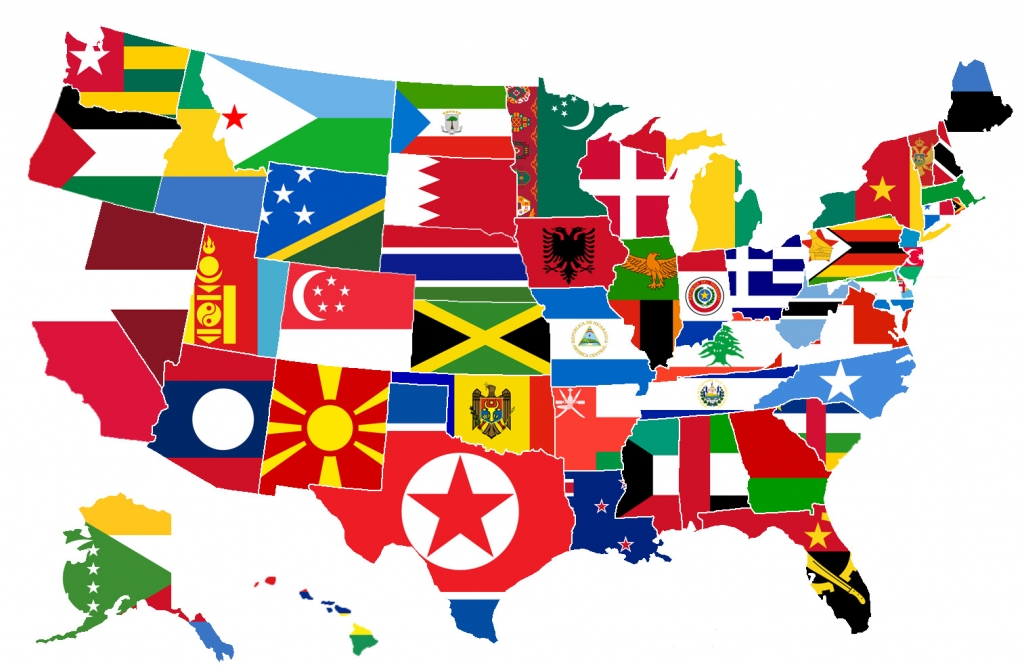
Image credit: James Richards, via Strange Maps
The dark corners of the intertubes are populated by weirdly animated detritus. In one particular corner I found Strange Maps, an intellectual terra incognita. Here is one map from the site, in which map-author and vexillologist James Richards has filled in United States states with the flags of other nations with populations equal to that of the correlate United States state. What is the point of such a map? It takes us nowhere. It is trivia, contrived comparison, meaningless. Indeed.
This *is* an odd land, and there is perhaps no better way to understand, as a stranger in a strange land, the strangeness than that quintessentially American experience and myth, the road trip. "Buy the ticket, take the ride," someone screams in Jack's ear as he discreetly tries to fill in his fantasy baseball roster.
In the Lonestar People's Republic of North Texorea . . . imagine it . . .
The high plains meth labs have been bulldozed. Justice remains swift. And decisive. The governor's call to secession has been fulfilled. President Rick Perry, in his paramilitary uniform of high commander, sings along to the Lonestar Republic's national anthem and reviews the People's Army, parading forth from Camp Mabry and into the Austin city streets. "Keep Austin Weird," the buzz-cut forces shout in unison as they pass the review stand. The death penalty endures, but the process has been expedited. The workaday Texicans have traded in their Pearl for Pulrosul (an alcoholic concoction bottled with a dead adder inside), and good ol' boys, no longer satisfied with whiskey and rye, swill the juice of the alcohol addled adders, and later bite their heads off. The mezcal worm has turned, into a snake. Our trip begins just out of reach of the center of State power in Austin, on Interstate 35. We drive north. "Keep the Weird in Austin."
The border crossing between North Korean Texas and Oklahoman Moldova is awkward, because our papers are not in order. Not wanting to allow the authorities of either nation state time to catch on, we speed further north. The Choctaw remain dispossessed, but the casinos still operate at full tilt.
Kansas, no longer safe harbor for Fred Phelps and his lolly-pop guild army of Westboro Baptist Church, is New Jamaica. One of the whitest states in the Union now caters to the cliches of Island tourist expectations. Bleached, Wonderbread whitened reggae is the new elevator music, and the tourists converge. But all is not well as Jimmy Cliff spins in his grave on the grain-fatted plain. "There's no place like home" and this ain't no island in the Caribbean, Dorothy. Home is not here. We can't flycast for bonefish in the New Jamaica. Definitely not home.
We spin across Nicaraguan Missouri. The Royals and Cardinals play futbol now. Jack is disappointed. We take in a few games, but the rioting is intolerable. A Pole is calling it the second soccer war. Back into the car. George Brett is not pleased, but he stays behind in Kansas City, and remains irregular. Or too regular.
Still bearing up I-35, we travel over the rich loam of Albanian Iowa. The border crossing is smooth here. There are no communists in sight at this crossing. The guards shake hands with each other and trade exotic brands of cigarettes. We turn a hard right on I-80 in Des Moines, which, because the Albanians are just happy to be here and the Iowans are such hospitable hosts, has been allowed to keep its neutrally French name.
East on I-80, and Illinois has become Zambian Illinois, not Kenyan Illinois, and right-wing conspiracy theorists continue to question the natal origins of President Obama.
In Paraguayan Indiana, Andes have sprung from the farms.
"Greek" Ohio is a wasteland. These are the wrong Greeks, frat boys. We don't stop, not for gas or even a quick piss.
We detour briefly into Guinea Michigan, and Detroit---the metaphorical literal coal fired asshole of American industry---has been replaced by the similarly coastal city of Conakry, population 1,857,153, and falling. There was never any auto industry here, just an unnecessarily malarial West African metropolis, population falling.
In Penn-Zimbabwe we turn south, off of I-80 finally and onto I-99, which brings us to State College and Penn State University, where "We are?!" is now met with resounding answers of "Zimbabwe!" when the call-and-response is initiated at random.
Back in North Korean Texas, immigration issues no longer rate, and across the Rio Grande Valley the Mexican nationalists are discussing the idea of a Great Wall to keep the riff-raff out.
Images like the map Richards has created have little immediate meaning, besides perhaps for the referential relationships they invite us to recognize or invent. Perhaps we do need the captions?
But this is all just silly, right? A silly series of comparisons, and rambling at that, invited by a silly image. Such comparison could not tell us much, or at least not much that is meaningful, about our more real world. Perhaps:
Kim Jong Il
Texas Governor Rick Perry
Texas Flag
North Korean Flag
Tunnel Under US/Mexico Border
Tunnel Under South Korea/North Korea Border

Recent comments
2 years 29 weeks ago
2 years 44 weeks ago
2 years 44 weeks ago
2 years 50 weeks ago
3 years 4 weeks ago
3 years 4 weeks ago
3 years 4 weeks ago
3 years 6 weeks ago
3 years 6 weeks ago
3 years 6 weeks ago